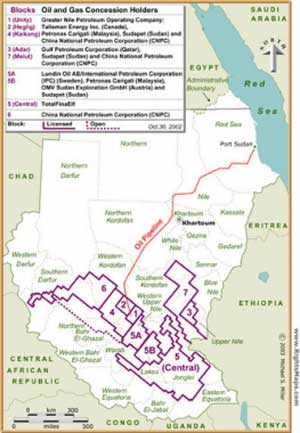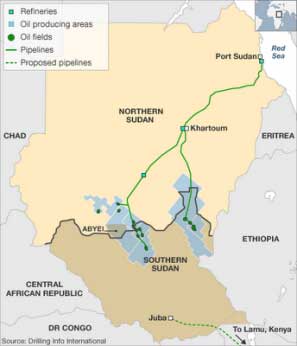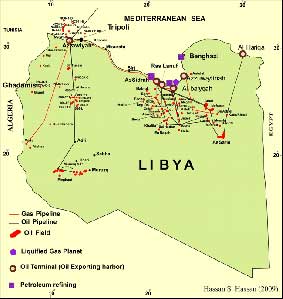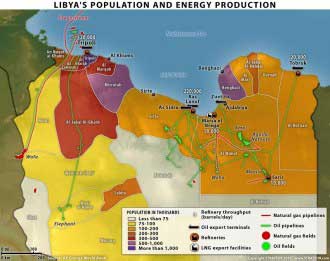Seeing Libya’s Future In Darfur’s Past
By Peripheral Revision
22 March, 2011
Peripheral Revision
The outcry over the current situation in Libya has been echoed from practically all segments of the political spectrum. Humanitarian intervention has a broad appeal in the west, a modern day continuation of its historical civilizing mission, bringing freedom and modernity to the backward peoples of the world. Those with the power of language have the power to control how complex issues are interpreted by the public. Robert Fisk has discussed this issue routinely in relation to conflicts in the middle east, focusing on the U.S. and Israeli governments’ knack for being able to manipulate events and policies by crafting media discourse through simple semantics. Language is a powerful tool in the hands of economic and political power who, when having learned to wield it effectively, can also be used as a weapon. This weapon has been instrumental in garnering support for overseas political and military objectives by the U.S. government throughout its history, most instructively in such circumstances where the necessity for war surfaces out of humanitarian considerations.
Libya has now become the most recent victim of western “humanitarian” intervention, where a vast majority of the western public was chomping at the bit for American bombs to be dropped on another country that they had not even known existed a month ago. While direct military involvement in Darfur materialized as “UN peacekeepers” as opposed to western aerial bombardments, the path of Sudan in recent years provides an invaluable scenario with which to view the events that are likely to transpire in Libya.
Kosovo in the 90s holds a particularly direct relationship with the current Libya situation, and such parallels have already been analyzed extensively (see here, here, here), but the connection to Darfur is just as relevant but much less critiqued in a similar fashion. Free from western-created narratives that have monopolized political discourse surrounding both these conflict zones, the selfless call for action for the preservation of humanity amounts to nothing more than just a pretty coat of paint on the all-too-familiar junk we’ve been sold before. A simple change in lexicon prevents many from engaging in the same critical assessment that they normally would had the call for military confrontation been more overtly espoused by the usual mouthpieces of the right-wing juggernaut. When one uncovers the actual issues and peels away the manufactured semantics, what is revealed is not a humanitarian struggle for rights and justice but the same sources of U.S. policy that we all know too well.
The “Save Darfur” movement is most commonly associated with the left. This remains one of the most prominent examples the way in which the left has been conned into fighting for what in reality are right-wing causes.
Chomsky explains the “Save Darfur” appeal in the west:
“But Darfur is a very popular topic for Western humanists because you can blame it on an enemy – you have to distort a lot but you can blame it on ‘Arabs’, ‘bad guys’.”
Elaborating further, Chomsky describes how the ambiguous assertions by western governments are simplified and exaggerated:
It’s a good question why Darfur is such an issue. I mean, there’s a lot of killing in Darfur. The numbers are apparently mostly made up, but it’s substantial. On the other hand, it isn’t a fraction of the dead in Iraq, let’s say, and it isn’t even a tiny fraction of the dead in the Congo right near by. So why is there a huge campaign about Darfur, and not one about a hundred times as bad about the Congo, and one a thousand times as bad about Iraq? Because we’re doing them…There are “Save Darfur” committees all over the place, but apparently not much funds — if anything — goes to Darfur. So it’s become a huge morality play.
Sudan was a country that was in the cross-hairs of western governments for decades. Endowed with sizable oil reserves and other natural resources, it was an African jewel just waiting to be firmly planted in the crown adorned by the west as self-appointed ‘king of the world’. But the days are past when direct colonialism can still be sold as an altruistic endeavor. The conflict in Libya more closely resembles the situation in Darfur than in recent Egypt. That is, in the sense that far from a mass movement fighting in opposition to the established concentration of power, what is at play are are factions vying for power. And like in Libya, the support of the west was not directed at alleviating the conflict, but by manipulating, and even stoking, the hostilities to best serve its ultimate interests in the region.
Where most of the condemnation by the international community (aka the west) focused on the Sudanese government, headed by President Omar Hassan al-Bashir, he was, by no means, the exclusive, or even most attributable, source of instability and bloodshed. When the ICC Indicted al-Bashir for atrocities in the Darfur region, President Hugo Chavez, similar to his current stand against the drum beat to war in Libya, refused to let this unsubstantiated accusation go uncontested, arguing in a speech that:
“The recent indictment against the Sudanese president Bashir is one of these ridiculous cases. It’s a farce…So why doesn’t the international court indict President Bush, who committed atrocities over eight years, for example, and annihilated the Iraqi people?”
This is not just rhetoric, but a factually accurate juxtaposition as the humanitarian disaster in Iraq was vastly more dire and expansive than the situation in Darfur. The difference here, as Chavez understood, was that while the crimes occurring in Iraq were at the hands of the U.S. government, the crimes being attributed to al-Bashir were at the hands of an “enemy” of the U.S. that needed to be confronted. What is ignored by the ICC ruling is that much of the conflict in Darfur was being perpetuated by the western supported guerrillas, not al-Bashir’s forces.
Genocide was often alleged to have been taking place in Darfur. This refrain was repeated in the run up to western attacks on Libya. Bloomberg reported charges from rebel allies:
“We think in the coming hours we will see a real genocide if the international community does not move quickly…We are counting on international forces to limit the number of victims.”
The use of the term genocide has direct and indirect effects. The power of semantics here clearly demonstrates the ways in which the perception with which certain actions are viewed have vast repercussions. Not only does genocide elicit certain feelings and resentment within the public beneficial to garnering support for military intervention, but this term in particular has legal attributes that determine mandated actions by the UN. The politics of genocide has been thoroughly analyzed in works by Edward S Herman, David Peterson, and Mahmood Mamdani, among others. Seeking to fuel the flames for intervention in Darfur in 2007, then President Bush uttered the magic word:
“My administration has called these actions by their rightful name: genocide…The world has a responsibility to put an end to it.”
Now we have Australia’s foreign minister Kevin Rudd arguing for the implementation of the Libyan no-fly zone asking the UN to “Look back at Darfur” and see how the resistance to engage militarily failed to stop the ensuing genocide. He then continued to assert that:
“I would hope the international community would learn from history, because in a month’s time, two months’ time, three months’ time, if for whatever reason Kadhafi begins to prevail and we see the large-scale butchery of Libyan civilians.”
The U.S. government is never one to hesitate from taking sides, as evident by Robert Fisk’s reporting on the Washington’s proposal that Saudi Arabia assist in arming the Libyan “rebels” against Qaddafi. The Egyptian military is also sending assault rifles and ammunition across the border. This is extremely reminiscent of U.S. policy in Sudan where allied nations acted as middlemen for arming anti-government factions. The release of the Wikileaks cables exposed the operation in Sudan, as reported in The New York Times:
It was September 2008 and a band of Somali pirates made a startling discovery.
The Ukrainian freighter they had just commandeered in the Gulf of Aden was packed with weapons, including 32 Soviet-era battle tanks, and the entire arsenal was headed for the regional government in southern Sudan. The Ukrainian and Kenyan governments vigorously denied that, insisting that the tanks were intended for the Kenyan military…
…But it turns out the pirates were telling the truth — and the Kenyans and Ukrainians were not, at least publicly. According to several secret State Department cables made public by WikiLeaks, the tanks not only were headed to southern Sudan, but they were the latest installment of several underground arms shipments. By the time the freighter was seized, 67 T-72 tanks had already been delivered to bolster southern Sudan’s armed forces against the government in Khartoum, an international pariah for its human rights abuses in Darfur.
Bush administration officials knew of the earlier weapons transactions and chose not to shut them down, an official from southern Sudan asserted in an interview, and the cables acknowledge the Kenyan officials’ assertions that they had kept American officials informed about the deal.
The cables reveal that the Kenyan and Ukrainian governments had worked in consultation with the U.S. to funnel unknown numbers of weapons into Southern Sudan to aid the secessionist movement. This particular freighter “was carrying 32 T-72 Soviet-era tanks, 150 grenade launchers, 6 antiaircraft guns and ammunition.” This is well beyond the publicly acknowledged provision of communications equipment, “non-lethal” weapons and combat training to guerrilla army.
It just so happens that the faction seeking to break off from the existing Sudanese nation, the side the U.S. has allied with, is territorially located on the vast majority of the country’s oil reserves. The goal is not necessarily to successfully dominate the entirety of the country, but to break off pieces from central control, preferably the areas rich in natural resources. Even Mike Mullen, the chairman of the Joint Chiefs of Staff has affirmed that removing Qaddafi isn’t guaranteed or even the prime military objective. This may make the attack seem more innocent, but, barring successful regime change, it follows the same plan that we have seen repeated many times. The Clinton administration was largely successful in its military campaign to “free” Kosovo. The secessionist forces in Santa Cruz, Bolivia are being supported by the U.S. as a means of regaining control over the region’s natural resources. Following the Bolivarian Revolution lead by Hugo Chavez in Venezuela, failure to topple the government has instigated U.S. operations to fuel secession of the oil rich Zulia region. The U.S. also backs the secessionist forces in Tibet in an attempt to sever off a large piece of territory from its biggest geopolitical rival.
Here are some images of Sudan. The newly formed country of South Sudan encompasses a huge swath of Sudan’s oil resources within its borders:


Now here is Libya. The potential end-game of the conflict in Libya is to establish a new, “independent” (meaning from anyone other than the U.S.) state in the resource concentrated region of the north-east. This is where the “rebel” stronghold city of Benghazi is located. From the map of Libya’s population density, you can deduce the approximate borders of a possible independent country:


The divide-and-conquer strategy has been well played out but it still manages elude public skepticism, at least until its too late to stop it. Where-ever a separatist group exists in an enemy country, the U.S. will be there to support it.
The long-awaited culmination of western destabilization in Sudan came with the recent referendum that partitioned South Sudan as its own country, free from Sudanese authority. The entire process was heavily funded by western nations, which also engaged in extensive propaganda campaigns aimed at raising the support and perceived legitimacy of the vote. Now the U.S. backed forces were able to establish sole control over the oil-rich region and subsequent development. It is never simply about “getting” oil, but about controlling it. There is a significant difference. As we’ve seen in Libya, western nations had easy access to oil under the control of Qaddafi, so “getting” it wasn’t the issue. The problem, from the view of western governments, was that China, Russia and other “strategic competitors” also had access and were increasing their proportion of the Libyan oil business. This was also the case in Darfur where China was increasingly coming to dominate the tapping of Sudan’s oil reserves.
All of this was yet also reminiscent of the situation of American oil companies in Iraq where U.S. sanctions on Saddam Hussein during the 1990′s blocked U.S. firms from exploiting the country’s oil while China and Russia, without such restrictions, were able to make one deal after another. Juan Cole, in his book Engaging the Muslim World points out Vice President Dick Cheney’s though process on the invasion of Iraq:
During this period, Cheney quickly emerged as an opponent of congressional attempts to slap ever more sanctions on countries ruled by regimes its members disliked. The United States imposed unilateral sanctions on Libya, Iran, and Azerbaijan and participated in multilateral sanctions against Libya and Iraq. Cheney, a former congressman, urged the petroleum industry to take a “proactive approach” to battling such sanctions. He complained that legislators multiplied trade sanctions as a painless way to take a stand on policy and to “satisfy their domestic constituencies.” The latter phrase referred in part to lobbying by the American Israeli Public Affairs Committee (AIPAC) to sanction states hostile to Israel.(136-137)
Cheney and other petroleum company executives had despaired of ever besting AIPAC on the sanctions issue. Therefore, they believed that they would be locked out of Iraq and Iran and their enormous oil and gas reserves while France, Russia, and China positioned themselves to benefit from developing those fields…if he pushed for regime change in Iraq and Iran, he could turn AIPAC and the Israel lobbies into allies of the oil majors’ plans for investment in Iraq and Iran. (139-140)
The U.S. doesn’t engage in any activity for “humanitarian” reasons. The Democrats, still having a sliver of credibility remaining, make the most out of it. Its a matter of picking the country first, figuring out excuses later. They foment an unquestioning public to become enamored with the altruistic mission of the American machine and an equal amount of vitriol for some far away dictator they allege is brutalizing his own people. A solitary message is dispersed by the western media without any attempt at balance, investigation or, for that matter, journalism. As Amy Goodman, host of Democracy Now!, pointed out on Al Jazeera in a discussion about the future of the media, she noted:
“In the United States we don’t have state media but you have to ask, in this country, if we had state media how would it be any different?”
Comments are not moderated. Please be responsible and civil in your postings and stay within the topic discussed in the article too. If you find inappropriate comments, just Flag (Report) them and they will move into moderation que.


